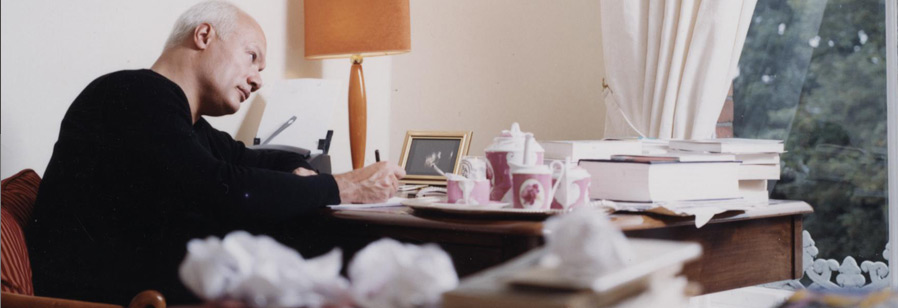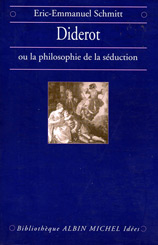Masterclass
Trailers
Monsieur Ibrahim et les Fleurs du Coran
x (x)
x (x)
x (x)
x (x)
x (x)
x (x)
Alle trailers
Zusammenfassung
Denis Diderot fand einen neuen Zugang zur Philosophie, der gekennzeichnet ist von Freiheit, Freigeistigkeit, einen Zugang, der aus Freude, Ungezwungenheit und Klarsichtigkeit besteht. Eric-Emmanuel Schmitt stellt das traditionelle Bild von Diderot in Frage, jenes Bild, das ihn als wissenschaftsgläubigen Materialisten und Positivisten zeigt.
Er zeigt uns einen problematischen, unsicheren Diderot, einen Diderot, der sowohl vom Schatten als auch vom Licht, vom Rationalen als auch vom Irrationalen angezogen wird. Welcher Philosoph des achtzehnten Jahrhunderts brachte der Nacht, dem Traum, dem Wahn, der Extravaganz, dem Genie so viel Aufmerksamkeit entgegen?
Diderot ging den Widersprüchen, den Sackgassen nach, in die der Geist gerät. Für ihn wird die Wahrheit zu einem unzugänglichen Ideal und durch das Denken soll diese Unzugänglichkeit ausgelotet werden. Der Philosoph gleicht eher der Sphinx als Ödipus, er gibt weniger Antworten als daß er Fragen stellt.
Es ist durchaus eine neue Art des Philosophierens, die uns Diderot vorstellt und eine neue Art, Philosophie zu schreiben. Fern jeglicher Gewißheit hält er sich an die Paradoxe. „Morgens sehe ich die Wahrscheinlichkeit zu meiner Rechten und nachmittags zu meiner Linken.“ Er liebäugelt mit den Theorien wie mit den Frauen, sie üben ihren Zauber auf ihn aus. Diderot stellt uns letztlich die erotische Seite der Philosophie vor.
Anmerkungen
Eric-Emmanuel Schmitt - « Phantasie und Ehrlichkeit. Es sind... »
Phantasie und Ehrlichkeit. Es sind sicherlich diese Eigenschaften, derentwegen mir Diderot so lieb ist. Er hat einem stets viel beigebracht und tut es noch.
Er lehrt Dinge, die nicht lehrbar sind: die Freiheit, die Unverschämtheit, die Leichtigkeit, den Widerspruch, den Wagemut.
In den Augen dummer und ernster Menschen ist Diderot wenig gesellschaftsfähig.
Sicherlich möchte ich gerade deshalb nicht seine Gesellschaft missen.Er führt jedenfalls, ohne aufdringlich zu sein. Er ist keiner, der Schüler hervorbringt, und wenn, dann bloß Schlingel, denn in seiner Gesellschaft kann man nur schlechte Manieren lernen. Ich stimme nicht immer mit ihm überein – er übrigens auch nicht.
Es gibt Philosophen, wie Kant – vor allem aber Pascal – die mehr mit meinen Fragen und Ansätzen gemein haben, die mir vollständigere Antworten geben. Doch Diderot gehört mit Lukrez und Montaigne zu jener wilden Außenseiterbande , die ich so liebe und die ich die Ritter des Ungewissen nenne.
Er erscheint mir dagegen unbestritten der beste – mit Pascal wiederum – unserer schriftstellernden Philosophen zu sein.Er ist weit davon entfernt, sich wie der Autodiktat Rousseau ins Zeug zu legen oder wie Voltaire seine Gedanken durch Phrasen zu verkürzen. Er lebt, er sucht, er zerschlägt jegliche Rhetorik, um seinen Stimmungen entsprechen zu können, und zittert beständig in den Serpentinen seiner Worte.
Er ist ein unerreichbares Vorbild. Er ist mein Vorbild als Schriftsteller.
Paris, den 23. August 2000.

